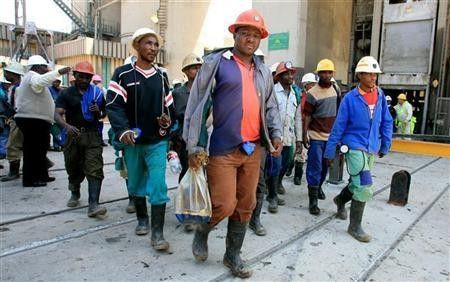South African strikes to spread to gold sector

South African gold miners will this week join thousands of workers seeking pay rises in widening nationwide strikes, threatening to hurt exports from Africa's largest economy at a time when bullion is at record highs.
Hundreds of thousands of workers across the country have downed tools in recent weeks, or are threatening to do so, seeking pay rises of double or triple the 5 percent inflation rate in mid-year bargaining known as "strike season".
Coal miners walked off the job late on Sunday and Monday and Anglo American has halted operations at its South African coal mines. Industry sources say the strike will pinch exports in two to four weeks.
The industrial actions have hit the wider economy with petrol workers in the third week of a strike and previous disputes in the engineering and steel sectors.
The powerful National Union of Mineworkers (NUM) wants a 14 percent increase in wages from gold employers -- including AngloGold Ashanti, Gold Fields and Harmony, which have offered rises between 7 and 9 percent.
Its spokesman said on Tuesday it had given the gold mines a 48-hour strike notice.
"We are disappointed by the decision taken by the unions. The offers made by employers today were a big jump from where we were the last time," Elize Strydom, the chamber of mines' negotiator for the gold sector, said in a statement late Monday.
In the gold sector, the chamber negotiates on behalf of the big three gold producers as well as junior miner Rand Uranium.
HOLDING GOLD
Traders are monitoring South African gold supply, particularly as the spot price of the precious metal is within striking distance of record highs scaled on Monday.
Spot gold hit a record high of $1,622.49 an ounce on Monday as U.S. President Barack Obama warned that failure to reach an agreement to avert debt default could cause a deep economic crisis.
"Declining mine supply, higher production costs, and less central bank selling are almost turning gold into a bit of a supply and demand commodity, even though 95 percent of its behaviour is still currency or investor-flow related," said Robin Bhar, an analyst at Credit Agricole.
"But if you're holding gold you're not going to want to sell it against a background of strikes in South Africa, which is the fourth-biggest producer."
South Africa was once the world's largest gold producer, but in 2010 ranked behind China, Australia and the United States, Reuters' data showed.
COAL AND FUEL TALKS
Should the strike be prolonged, it could hit the already strained power supply along with coal exports.
Power utility Eskom said the strike posed no immediate supply danger to its coal-fired plants as it has extra stocks.
Optimum Coal, South Africa's sixth-largest coal miner, which sold 10.6 million tonnes of coal in the 2010 financial year, is operating at 10 to 20 percent of its normal capacity due to the strike, it said on Tuesday.
Unions and employers in the sector resumed talks on Tuesday in a bid to end the coal dispute. The NUM has been seeking inflation-busting 14 percent wage increases, above the employers' offer of 7 to 8.5 percent.
Employers over the past two years have struck wage deals averaging about 8 percent. Many companies view above-inflation settlements as a necessary cost of doing business in South Africa. They have also slashed jobs over the period to make up for the higher personnel costs.
Unions will also hold talks with employers in the fuel sector, hoping to end a strike which is into its third week and has left hundreds of pumps dry across the country.
Economists have said wage settlements well above inflation could hurt competitiveness and the long-term outlook by driving up the labour costs.
But unions argue the official inflation rate does not reflect the full impact of rising food and fuel prices on the incomes of its rank and file.
© Copyright Thomson Reuters 2024. All rights reserved.





















